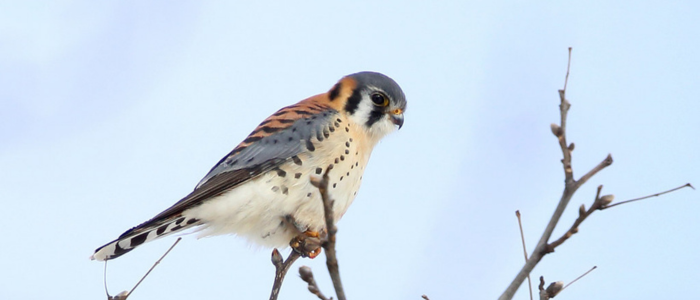The State We're In
The power of people protecting birds
By Alison Mitchell, Executive Director, New Jersey Conservation Foundation
The most inspiring conservation efforts often start in the hands of everyday people who care deeply about local wildlife and open spaces. That’s what’s unfolding right now for one of New Jersey’s most vulnerable birds – the American kestrel.
The smallest falcon in North America, the American kestrel is a colorful, captivating raptor that once flourished across our state’s fields and meadows. But in recent decades, their numbers have sharply declined. While the exact reasons remain uncertain, experts point to the degradation of high-quality habitats – including loss of nesting sites – as a likely culprit. There has been a precipitous decline in the kestrels’ food supply as insects have dwindled because of agricultural pesticides, especially the widespread use of dangerous neonicatinamide-coated seeds for soybeans and corn.
Now, a coalition of organizations and citizen volunteers is working to reverse that decline through a project called Hatch 100. Led by Friends of Hopewell Valley Open Space (FoHVOS) and Wild Bird Research Group, the goal is straightforward: to install 100 nest boxes across suitable habitats and monitor them annually, helping kestrels find the spaces they need to survive and raise their young.
The kestrel nest boxes are built primarily by boy scout troops and caring community members who put up and monitor them. In this state we’re in, conservation efforts are an all-hands-on-deck activity!
That’s what Emmy Broeg, an amateur birder and mother of two, learned when she showed up to a small gathering to learn about Hatch 100. “Quite honestly – I don’t think I’m a very good birder. I just wanted to experience being outside more, but doing it with a purpose,” she says.
Broeg volunteered to help build nest boxes, got a friend with a farm to host one, and is a nest box monitor. She was assigned three boxes for the season, and to her surprise, one of them hosted a brand-new kestrel nest. One of the eggs hatched and the young falcon took flight for the first time!
“It felt like Christmas morning,” she says. “Just pure excitement.”
Success is only possible with hands-on support from citizen scientists. “There’s so many people that want to help,” says Jenn Rogers, executive director of FoHVOS. “They step up and make it happen.”
Kestrels are cavity-nesters, meaning they don’t build their own nests but use tree holes or abandoned woodpecker cavities. As those natural spaces disappear, nest boxes provide an essential substitute. Volunteers track occupancy, note the species using the boxes (sometimes native bluebirds or invasive starlings move in), and report back on outcomes like egg-laying and fledging.
For Broeg, the project has become a form of both environmental activism and personal fulfillment. She emphasizes that no formal science background is needed to participate. “I’m not a biologist. I’m learning as I go,” Broeg says. “But I care. That’s what matters. If you’re curious, and willing to show up and ask questions, you can do this too.”
Broeg has taken to social media to share her journey, hoping to inspire others. Earlier this month, her social media advocacy gained her recognition in a write-up by the American Birding Association!
The success of one kestrel chick may not seem like much, but as Broeg puts it, “When one fledgling leaves the nest, that’s one more kestrel in the world than we had before.”
Rogers says that since they began putting up nest boxes, data has shown a 600 percent increase in successful kestrel fledglings. That’s an impressive example of small, community-led actions adding up to something big, and it’s helping to give New Jersey’s smallest falcon a fighting chance.
To learn more about the Hatch 100 program, please visit https://www.fohvos.info/kestrel-nesting-boxes/.
To learn more about how you can help preserve New Jersey’s natural resources, visit the New Jersey Conservation Foundation at www.njconservation.org or reach out to us at info@njconservation.org.
About the Authors
Alison Mitchell
Executive Director
Michele S. Byers
Executive Director, 1999-2021
John S. Watson, Jr.
Co-Executive Director, 2022-2024
Tom Gilbert
Co-Executive Director, 2022-2023
View their full bios here.
Filter
Get The Latest News
From The Garden State
In the
News

